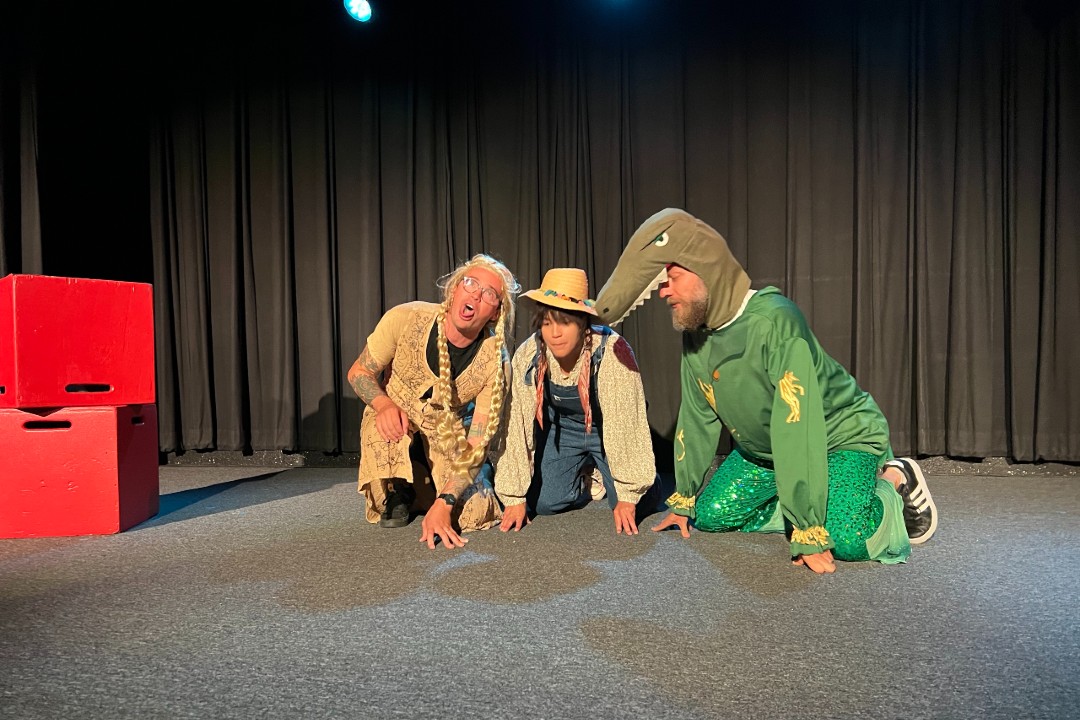Rapid Fire Theatre is using artificial intelligence for comedic effect in a show called Plays by Bots, which runs from Aug. 16 to 24 as part of the Edmonton International Fringe Theatre Festival.
Matt Schuurman, the executive director of Rapid Fire Theatre, told Taproot that using AI is not new to improv theatre in Edmonton, that tools and approaches for experimenting with it were developed here, but that using these tools responsibly is essential.
"We recognize the power of (AI) tools, and we also have seen people use them irresponsibly — and also tools that have been built irresponsibly — but we've also seen tools used for good," Schuurman said. "I think it's important to know the power of these tools and the power that you wield when you use them, and to understand where they come from and what they're doing, and to use them in responsible ways."
In Plays by Bots, Joe Vanderhelm, the show's producer, gets three words from the website Random Word Generator, then has ChatGPT generate a play synopsis based on those words, and then gives a condensed version of the synopsis to an AI tool called Dramatron so it can generate half of a script. Then, Vanderhelm seals a portion of the script in envelopes, and improvisers read it for the first time live on stage until it runs out. Finally, the improvisers come up with the second half of the show. The method is a twist on the improv format "blaff," which is the same but with a human playwright.
Kory Mathewson, a senior researcher at Google and an improviser, co-developed Dramatron, and has written about blaff's origins in Edmonton.
Vanderhelm first staged Plays by Bots for Rapid Fire in June 2022, and has put it up at the Fringe annually ever since. "(The first script for Plays by Bots) was called Darren Can't Handle the Temperature of His Soup," Vanderhelm told Taproot. "It's effectively a four-scene, one-act play, where the first three scenes are a man talking to a bowl of soup. He has a wife character who basically thinks he's losing his mind. She leaves him, and then in the final scene, the soup talks back at him. It's terrible — it is really not great. But if you were a fan of theatre of the absurd, you would be salivating."
Vanderhelm said the poor quality of writing produced by Dramatron fuels the comedy of the improvisers, who work with it rather than against it. To be fair to Dramatron, he said, Rapid Fire still uses the first version of the bot rather than an improved, updated version. The worse the script is, the better the comedy is, Vanderhelm said. "I don't want it to be better, because better, in this case, is actually going to be worse."
Schuurman added that better led to less funny. "The bot was learning and growing, and the scripts that it made in 2023 were not as funny as they were the year before. They were so cumbersome and awkward, but not so blatantly bad. It was making safer choices, which meant more boring choices. It (still) wasn't good theatre, but it wasn't good comedy, either."
Because of how bad AI is at writing human scripts, Vanderhelm said he doesn't think AI will put improvisers or playwrights out of a job any time soon. (Most improv is AI-proof anyway, because it's made up on the spot.) Still, as part of hosting Plays by Bots, he begins each show with a speech to the audience about responsible AI use in the arts.
"I talk about the elephant in the room, and how all of us artists are concerned that bots will come for some aspects of our jobs," he said. "We are aware that what we're doing could look kind of dangerous, but then I go on to explain that the bot we're using should be no threat to anyone, especially in the way that we are handcuffing it on the back end."

Rapid Fire Theatre's Plays by Bots sees improvisers find the ending for a half-finished script generated by artificial intelligence. The scripts are bad, and that's good for comedy in more ways than one, show producer Joe Vanderhelm said. (Supplied)
There's a precedent for artists resisting AI, Vanderhelm noted. Generative AI was a central concern in 2023 strikes by the Writers' Guild of America and Screen Actors Guild-American Federation of Television and Radio Artists. The strikes caused a production shutdown in the American film and television industry that led to unemployment for artists and cancelled projects, expensive delays, and layoffs for studios and networks. Closer to home, the Rosza Foundation, which focuses on leadership and management in the arts, has a series of commitments and guidelines for using AI. "We will never use AI at the expense of artists of any kind and recognize that AI-produced products are not a replacement for art," reads one commitment.
This year, Rapid Fire will mount Plays by Bots with new and old scripts. "Fruit," "election," and "bees" are the words used to generate one of the returning scripts. All shows take place at the Rapid Fire Theatre Exchange on 83 Avenue near 105 Street, which the company moved into in 2023.
